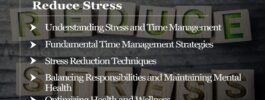Introduction
In today’s fast-paced world, time management has become a crucial skill for both personal and professional success. With the constant demands and distractions that come our way, it can be challenging to stay focused and productive. This is where mindfulness comes into play. Mindfulness, the practice of being fully present and aware in the moment, can be a powerful tool in helping us manage our time more effectively.
What is Mindfulness?
Mindfulness is a practice rooted in ancient Buddhist traditions that has gained popularity in recent years for its myriad benefits on mental, emotional, and physical well-being. At its core, mindfulness involves paying attention to the present moment without judgment. It is about being fully engaged in whatever we are doing, whether it’s a simple task like washing dishes or a complex project at work.
The Connection Between Mindfulness and Time Management
At first glance, mindfulness and time management may seem like unrelated concepts. However, when we delve deeper, we can see how they are intricately connected. Mindfulness allows us to cultivate a sense of awareness and presence that can help us make better decisions about how we use our time. By being mindful, we can avoid the trap of multitasking, which often leads to decreased productivity and increased stress.
Benefits of Mindfulness in Time Management
- Improved Focus: Mindfulness helps us train our minds to focus on the task at hand, rather than getting distracted by external stimuli. This heightened focus can lead to increased productivity and efficiency in our work.
- Reduced Stress: When we are mindful, we are better able to manage our stress levels by staying calm and composed in the face of challenges. This can prevent us from feeling overwhelmed and help us approach tasks with a clear mind.
- Better Decision-Making: Mindfulness allows us to tune into our inner thoughts and feelings, enabling us to make more informed decisions about how we allocate our time. This can lead to better prioritization and overall time management.
- Increased Creativity: By being fully present in the moment, we can tap into our creativity and problem-solving abilities more effectively. This can lead to innovative solutions and a more fulfilling work experience.
Practical Tips for Incorporating Mindfulness into Time Management
- Start your day with a mindfulness practice, such as meditation or deep breathing exercises, to set a positive tone for the day ahead.
- Use mindfulness techniques, such as body scans or focused breathing, to stay grounded and present during tasks that require your full attention.
- Take short mindfulness breaks throughout the day to reset and refocus your mind, especially during moments of stress or overwhelm.
- Practice mindful listening during meetings or conversations to improve communication and build stronger relationships with colleagues.
- Reflect on your day with a mindfulness journal to identify areas where you can improve your time management skills and make adjustments as needed.







